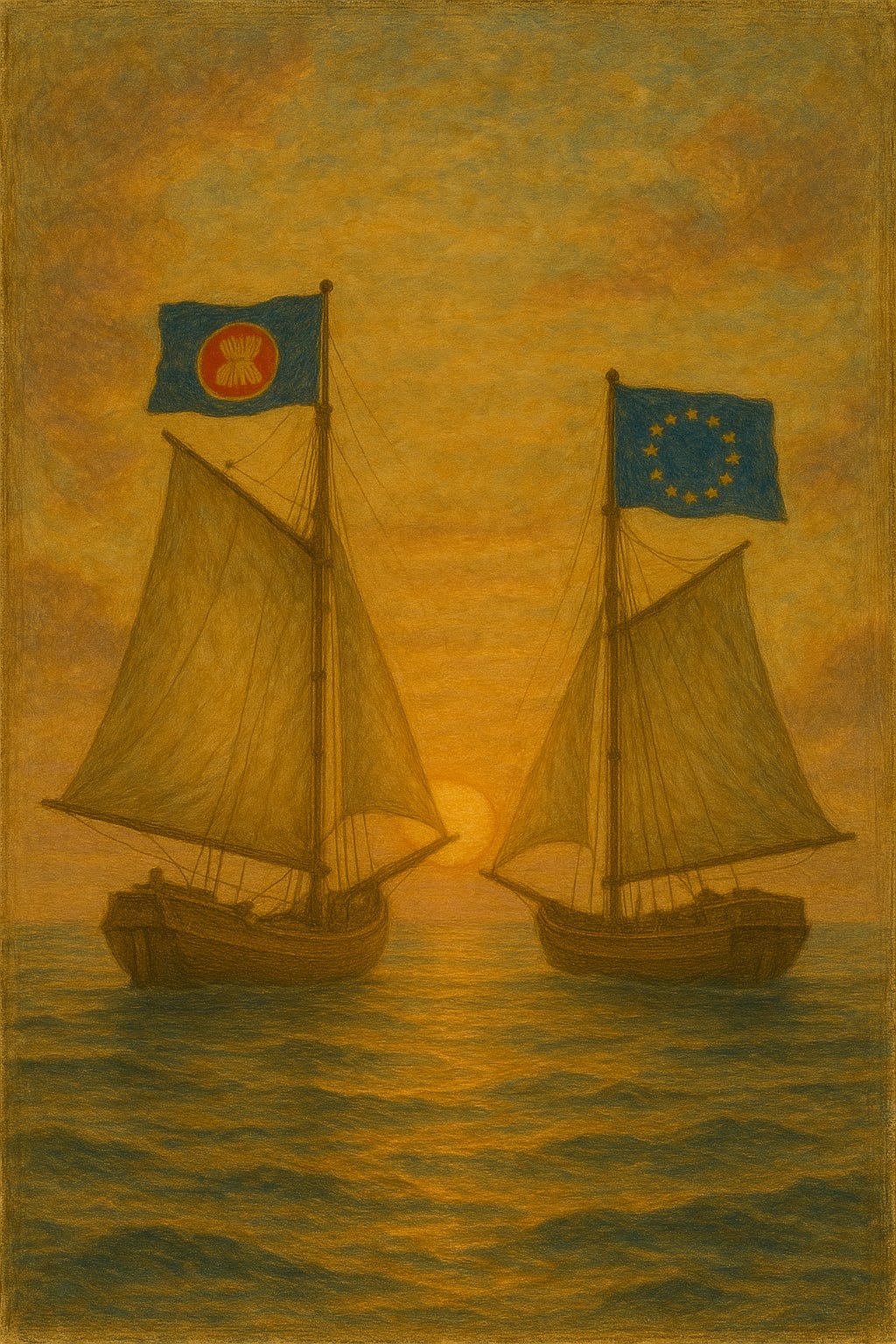EUROPE'S GEOPOLITICAL FUTURE: STRENGTHENING DIPLOMACY WITH ASEAN TO ENSURE STRATEGIC AUTONOMY
by Emma Cantos Soto
In a world increasingly marked by geopolitical competition, Europe faces the challenge of developing a strong foreign policy to navigate external pressures coming from other global powers. To achieve this, the EU must diversify its alliances and deepen its presence in key regions such as Southeast Asia. In this context, the Association of Southeast Asian Nations (ASEAN) emerges as a crucial strategic partner, both for its economic weight and its geopolitical importance in the Indo-Pacific.
Since the end of World War II, Europe has rebuilt itself thanks to the Marshall Plan. However, this reconstruction came at a cost: a complete delegation of security to the U.S. and, later, in the early 1980s, a delegation of economic sovereignty to globalization. This meant relying on low-cost countries such as China for industrial production and Russia for natural gas. This model was successful, but only while stability in Europe was present. Once the post-war international order has finished and new instabilities have appeared, partners' interests have separated from the European ones, leaving all members powerless in the face of a new world. The 2008 financial crisis, the COVID-19 pandemic and the outbreak of full-scale war in Ukraine have been key factors forcing Europe to reconsider its reliance on external actors. As the global order shifts towards multipolarity, there is an urgent need to diversify alliances, trade routes and supply chains while also intensifying Europe’s geopolitical presence.
This is when ASEAN gains relevance as a key stake-holder in the Indo-Pacific, offering political diversity, regional stability and a fast-growing economy with significant possibilities. ASEAN currently consists of ten members: Brunei, Cambodia, Indonesia, Lao, Malaysia, Myanmar, Philippines, Singapore, Thailand and Vietnam. According to Oxford Economics, these countries experienced a 5.03% GDP growth in 2024, which demonstrates a stable climate favorable to further investment. However, a potential alliance between the EU and ASEAN is not a new concept, these two organisations have had many diplomatic approaches since 1977 when the EU was not even as we know it today. Together they signed many agreements such as the ASEAN-ECC Cooperation Agreement in 1980 or the Nuremberg Declaration on EU-ASEAN Enhanced Partnership which have empowered the collaboration of both organisations.
But which are exactly the opportunities of cooperation with ASEAN? First and foremost, trade and investment: European companies can diversify their economic partnerships and benefit from a reduction of dependencies on China. A Free Trade Agreement (FTA) with ASEAN could promote investments flows between companies, enhance the access to markets of boths regions and reduce tariffs in a comprehensive way. Additionally, Europe can renew manufacturing and supply chains, especially for electronics, semiconductors and pharmaceuticals now delegated to China. In this context of geopolitical tensions, this strategy would ensure a stable and balanced trade balance for both organisations, avoiding market fluctuations derived from other countries's problems.
Another key area is security and defense. With rising tensions in the Indo-Pacific and China's efforts to expand its sphere of influence, the EU has an opportunity to fill the so-called grey-zones. One way to do so is through maritime security cooperation in key trade routes such as Malacca Strait, in which there is not enough security in the face of countering piracy and illegal fishing. Furthermore, European defense firms could expand their production and market reach to ASEAN, not only in military capabilities but also in advanced strategic technology. AI-driven security systems, drones and naval infrastructure are all areas where Europe expertise could benefit ASEAN, while also increasing Europe's geopolitical leverage.
Finally, connectivity and infrastructure play a crucial role. Europe launched the Global Gateway Initiative in 2021 as an alternative to China's Belt and Road Initiative (BRI), but ASEAN remains largely dominated by Chinese influence. The investment in transport and digital infrastructure such as 5G, high-speed rail and port modernization will benefit Europe as ASEAN will become less dependent and thus, China will not have that much power to pressure Europe economically as it does now. Additionally, the European model of infrastructure development is transparent and sustainable in economic terms and most importantly, it prevents the inference of Chinese technology companies as Huawei which are a threat in terms of national security and sovereignty. Without the exhaustive control of these companies and a fair self-developed ecosystem, Europe could ensure its own technological and cybersecurity autonomy.
All these strategies would push the EU to a better position on the global stage, but is it that easy? Are other powers like China going to let Europe follow its plans? In terms of European unity, one challenge could be the lack of cohesion in this type of foreign policy, with divergent opinions on what approach should be adopted. Moreover, political pressures must be considered, China will apply tough diplomacy to secure its own influence area which could clash with European interests. Therefore, to ensure a stable alliance foreign policy should adopt a multilateral approach that involves other partners such as Japan or India.
In conclusion, the deepening of EU-ASEAN relations presents a crucial opportunity for Europe to strengthen its strategic autonomy by diversifying trade, securing alternative supply chains, and expanding its geopolitical influence. Deep cooperation in trade, security and infrastructure allows Europe to reduce its dependence on major powers like China, while contributing to ASEAN’s economic and technological development. However, challenges remain, including political pressure from China within ASEAN and Europe’s own lack of a cohesive foreign policy in the region.
Overcoming these obstacles requires a long-term diplomatic commitment, increased economic engagement, and strategic investments in key sectors. By empowering a stronger partnership with ASEAN, the EU can solidify its position in the Indo-Pacific, mitigate external dependencies, and establish itself as an independent and influential global player in an increasingly multipolar world.





Great article, it summarizes very well the problematic relationship between the EU and the US.
Amazing work! I'm so proud of you.